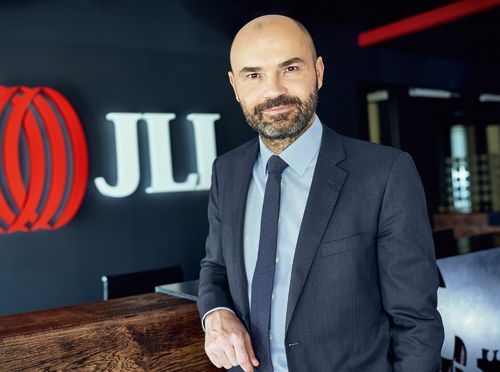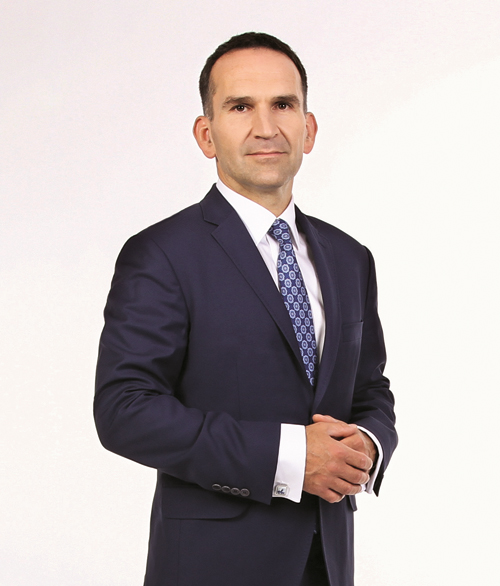Advice off the beaten track
Investment & finance
In the last few months we have heard that: Savills and CBRE are to provide clients with a new cross-sector approach; Savills and JLL are setting up teams specialising in alternative asset classes; JLL has acquired residential market consultancy Reas; BNP Paribas Real Estate is engaging with the residential and land market in some less specified way; while Colliers International has established a multidisciplinary department for introducing the latest technology and innovations to the company.
Homes no longer neglected
In December 2018, JLL took over residential consultancy Reas. “The residential market in Poland is still growing in importance while also developing in commercial directions, examples of which include rental apartments, retirement homes and student halls, which are all now catching the attention of institutional investors. The knowledge and experience Reas will contribute to JLL will support us in devising services tailored for the residential sector in our operations across the entire CEE region,” explains Tomasz Trzósło, JLL's managing director for Poland and Central and Eastern Europe. JLL has actually been working with Reas for several years. “The formal combination of our forces was just the latest natural step in this direction,” adds Tomasz Trzósło. Along with the managers of the other consultancies that have decided to expand their businesses, JLL explains that this latest addition to their operations is in response to the changing requirements of clients. “We have been seeing substantial interest in residential real estate, not just from foreign investors but also from domestic players. They are coming to us with enquiries about the possibility of purchasing large residential portfolios. It is not individual apartments that are sought after, but entire buildings or larger parts of them or well-structured platforms of rental apartments. Clients are interested in projects at every stage of construction. They also have the option of forward purchase deals,” says Marcin Klammer, the CEO of BNP Paribas Real Estate for Central and Eastern Europe, who told us that the company’s clients also include developers that build apartments for rent and intend to sell them in packages. “We intend to develop this department in our company. We are also involved in investment land transactions for residential projects. And there is one other interesting area of the market. These are projects requiring the repositioning of existing buildings, such as office and industrial buildings that would be suitable for residences. Here we can also see a great deal of investor interest, although the product is more complex and not suitable for every client. We have done this before, but in a rather ad hoc way. Now we want to focus on it,” reveals Marcin Klammer. Savills is also about to change, shifting its focus towards investment consulting, for example. The company’s managing director, Tomasz Buras, has taken on the position of director of the investment consultancy department to introduce this new strategy himself. “Over the last 3–4 years, Savills has doubled its revenues and number of employees. During this time we have launched new business lines and made a great number of structural changes. What they have in common is the fact that they originate from clients’ actual needs. We are a dynamic organisation that is able to react very quickly in a changing market,” comments Tomasz Buras, the managing director of Savills in Poland.
The managers of the companies we talked to all say that such changes have become inevitable, while also pointing out that seeking out new directions is natural for any good manager. And that they want to make themselves stand out from the competition. “As a company, we have to move forward, diversify our sources of income and be prepared for the various market cycles and eventualities as well as less obvious investment opportunities. We would like to base our operations in several areas and if one of them is perhaps less workable for a time, the others will be make up for it,” says the head of BNP Paribas Real Estate. JLL has also expressed a desire to expand its services further. “We also want to have a wide range of competences in all the most important areas of the real estate market of the country. Hence the determination we have shown to enter the residential market. Furthermore, for some time we have also been developing our ‘design and build’ business, Tétris Poland. At the beginning of last year, we also added the hotel segment to our competences and later added the flexible office space sector. We are also working intensively on our range of services for creating a friendly and effective work environment,” explains Tomasz Trzósło of JLL.
Striking gold in unexpected places
According to JLL, after the acquisition of Reas the company became the first consultancy in Poland that provided services for all areas of the real estate business. So what’s next for JLL? “We have set ourselves further development goals and want to be better at what we do, in all areas. That’s why there’s plenty for us to do. Thus our priorities for the next few months are to keep improving our services and to increase their innovativeness in order to meet the needs of JLL’s clients better,” the head of the company tells us. Marcin Klammer emphasises that the main goal of BNP Paribas Real Estate Poland is to maintain its strong position and excellent results in the business lines that it already has in operation. “This is our absolute priority. However, the market is so dynamic and projects are changing so quickly that some of those that had seemed on paper to be guaranteed winners have been suspended, while a number of supposedly low-profit projects have turned out to be goldmines. I also have to add that the new fields we are now taking on are part of the process of differentiating ourselves from the competition,” the company’s boss explains. BNP will also be enhancing its design consulting department. “This might seem like nothing new, but having worked in this sector for many years I can see many areas where we can make ourselves markedly distinct from the competition. In terms of the quality and type of service, these fields are design consultancy, investment consultancy and development management,” declares Marcin Klammer.
JLL believes that the acquisition of Reas will allow the company to provide a quality and scale of services on the residential market that competitors will not be able to match. “That doesn’t mean, however, that our rivals will just leave this sector to us. The residential segment and student halls will also continue to be an area of interest for other agencies,” adds Tomasz Trzósło. “The same is happening in the hotel and design-and-build sectors. Some of our competitors are trying to add to their competences in these fields. But we are confident that we can establish ourselves as the leader,” adds the head of JLL.
Undiscovered land
BNP Paribas Real Estate Poland believes it has identified an unexplored niche. The company does not want to specify exactly what its new business line will be, but it is clear that it is related to land. “We have been monitoring the development of the land market in Poland for the last 30 years, how the availability and types of plots and sites have changed during this time. Greenfield projects used to be the most sought after – but now brownfield developments are all the rage. Projects that have recently been developed in Warsaw have involved the demolition of buildings constructed in the late 1980s and early 90s. Just after the transformation of the political system in the early 90s, the idea of demolishing a new and functioning building was unthinkable. Eventually, however, the market evolved in such a way that people were encouraged to actually create the sites they needed by knocking down such buildings to make room for more profitable ones. The value of our advice in the field of investment lies in the fact that we can advise our clients on the best way to use a plot, land or real estate, on what use would be the most profitable and most in line with the client’s goal – whether it’s long-term or short-term profit,” explains Marcin Klammer, who goes on to add that the company’s competition in the land sector is daunting, but BNP aims to come out on top in this land grab with the support of specific departments based in the UK and the real estate departments of the bank itself. Another source of inspiration for new areas of consultancy is the cycle of the Polish business sector. Companies that have been run by certain people since the beginning of the 90s are now often at the stage of either the helm being handed over to the next generation of the family or of actually being sold. “And these changes open up many opportunities for companies such as ours to support this kind of transformation through consultancy. We provide consultancy on all aspects of real estate regardless of its purpose. Even if companies are functioning well and have been for years, there’s always a place for consultancy, especially when changes at the top or of ownership are taking place, whether it takes the form of a succession or not. This is the right place for us,” explains the head of BNP Paribas Real Estate.

“The new areas of our consultancy will be addressed to a unique niche,” reveals Marcin Klammer, the CEO of BNP Paribas Real Estate for the CEE region
A multitude of changes
Savills is focusing not only on investment consultancy, but also on embracing more of a multi- disciplinary approach. For this purpose, the company has set up a kind of hub that provides a comprehensive range of consultancy services for the commercial real estate investment market, involving cooperation between the company’s departments. Another change is the widening of the scope of services provided by the valuation and advisory department, which is changing its name to the capital advisory and valuation department. The team is to be headed by its current director, Kamil Kowa, who has strengthened the company’s position on the valuation market inm the last three years. The department has been using its own software, which, among other tasks, automates real estate analysis processes, including those for due diligence. The company has also extended the range of its services by providing advice for investment funds with a particular focus on portfolio deals and new asset classes – rental apartments (PRS) and student halls. “Savills is globally the leader in the student housing and apartments for institutional rent markets. This is a strong background for us to have because of the growing interest in these new asset classes in our part of Europe. Furthermore, the growing scale of investment fund activity in Poland has been encouraging them look for support in the rapid analysis of real estate portfolio deals, as well as consultancy in the field of real estate financing. We are able to meet such needs,” he claims. in light of the growing impact of the e-commerce sector on traditional retail. Monika Janczewska-Leja, the head of Savills’ retail advisory and transactions department, will be introducing a new strategy for the company’s investment hub. In addition to providing representation services to landlords and tenants, she will work with other departments on the purchase and sale of retail properties. At the end of last year, Savills also set up an investment consultancy team for the warehouse and industrial sector, which operates within the investment advisory department. Three new people were hired for this purpose, including John Palmer. “Last year we introduced a number of changes to several departments in the company, and the latest one concerns our project management team. After extending the scope of its services, it will now be called the building and project consultancy,” reveals Tomasz Buras. The changes were the initiative of the new director of the department, Jakub Jędrys. The team has also been enlarged. As a result, Savills can advise large corporate tenants on space arrangement and provide technical advice to developers and property owners.
Putting innovation to the test
Colliers International has also decided to move into a new field. Sylwia Pędzińska, a senior partner in the company, is to be responsible for innovation and knowledge. The new services are aimed at developing the business of the future. So far the company only intends this new field of its activities to be developed and used by Colliers itself, but it is considering providing clients with consultancy in this area at some stage in the future. In her new role, Sylwia Pędzińska will be responsible for initiating, testing, managing and introducing new systems for the company, but of a social as well as a technological nature. “My job is to promote a new approach to business among the company’s employees. This is to result in a more modern view of the real estate sector and should help open us up to new products as well as the latest technology and innovations, so that no one in the company is nervous about using this,” she explains. “We want to keep abreast of the latest trends and technology and the possibilities of using them in our work. We want to be an actual leader in innovation and introduce new trends and concepts. Such activities will help us meet the expectations of our clients in the most effective way possible, while acquiring new ones and standing out from the competition,” adds Monika Rajska-Wolińska, the managing partner of Colliers International in Poland. ν






















































